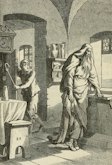The King of the Fishes
A fairy tale by Ludwig Bechstein
All children know the fairy-tale that tells how the birds wished to choose one of their number to be King, how he should be King who could fly the highest, and how the heron flew highest, but that little joker, the wren, had perched on the heron’s back, and when the heron had flown the highest and could fly no higher, then the wren used its own wings for the first time, soaring up and proclaiming itself King: “I’m the King! I’m the King!”
They also know how that sorely vexed all the big birds, who wanted to bring him back down to earth, and they said: he should be King who fell the deepest; and the wren fell down through the air and into a mousehole, from out of which he cheeped, “I’m the King! I’m the King!” – and afterwards the birds, by way of mockery, called him Kinglet.
The clever choice of King of the Frogs is also universally known, and likewise the lion being the King of the four-legged animals, and bees and ants having Queens.
But the fishes once having lit upon the idea of choosing a King, that is less well-known, and this is principally because the fishes – at least to the human ear – are dumb, do not make a fuss, and do not start up any idle prattle when they choose Emperors or Kings.
The fishes were all assembled, and they cried in their language: “When we have a look round the bustling world, we perceive both to our right and to our left that everything has a King and is ruled over, animals and birds, insects and amphibians. Only we still do not have a sovereign! Let us therefore choose one who will dispense justice among us and help the weak against the strong, and let us choose the one who is the fastest and most skilful swimmer.
“Whoever is ahead of all others has the natural right to be our King not only in name but also in fact.”
This proposal pleased the majority of fishes; almost all of them agreed that whoever swam the fastest should be King of the Fishes in name and fact. The finishing line was fixed, and the spectators cleared a long lane to let the competing swimmers go past, while the sword- and sawfishes swam hurriedly up and down and kept order; anyone who pressed too far forward was given a slap on the chops with the flat of their blades.
The flying fishes shot up into the air to watch the race to be King with a bird’s-eye view, but always fell back plump! into the water. The armour-clad knifefishes lined up on parade to cry a Viva to the victor and pay homage to him, which a powerful choir of gurnards and armour-plated bullheads attempted to accompany with a grunting fanfare. The stargazers, also a species of fish, prophesied that the royal election, like so many in the world of men, would have no brilliant consequences; the trunkfishes and striped seabream remained aloof and were of the opinion that a King was quite unnecessary, and they had to disapprove exceedingly of his manner of rule in advance, no matter how he might govern. Lastly, the small sticklebacks cracked bad jokes about all parties and parodied, among themselves, the swift swimming with great good humour.
Now an old electric ray lashed his electric tail to give the signal, perceptible to everyone at once, for the race to begin, and then the fishes shot forward, pike and tench, perch and carp, salmon and turbot, plaice and lamprey, all in a muddle – the plaice initially stayed behind the others, saying, “Why bother? Even a slow pace takes you far.” Ahead of all others was the pike, who was shooting forward like an arrow when a mocking voice beside him suddenly cried, “More haste, less speed, good pike!” and a small fish darted past him like lightning – and was the first to reach the royal finishing line.
Now everyone shouted, “The herring is first! The herring is first! Three cheers! Long live the herring! Viva!”
Then the knifefishes presented arms and the gurnards peed in parade step.
There was great joy among the fish-folk, but the plaice, who was swimming very slowly behind the shoal, did not hear very clearly who was being proclaimed as victor and King so far up ahead; and he asked a flounder, who was keeping him company in his slowswim: “What are they shouting? – Who is first?”
“They are shouting, ‘The herring is first!’” cried the halibut or the flounder, somewhat loudly in the plaice’s ear, whereupon she retorted, pulling a wry face from sheer anger and resentment: “Hey now, don’t shout like that; I can hear, you know! – So, the naked herring? The rogue, the naked herring!” And ever since that time, the plaice has had a crooked mouth.
But the stargazers had been right: governance was made very difficult for the new King, and he could not quite assert himself– there are far too many Kingfishers.
The New Book of German Fairy Tales

Notes: Translated by Dr. Michael George Haldane.
Contains 50 fairy tales.
Author: Ludwig Bechstein
Translator: Dr. Michael George Haldane
Published: 1856